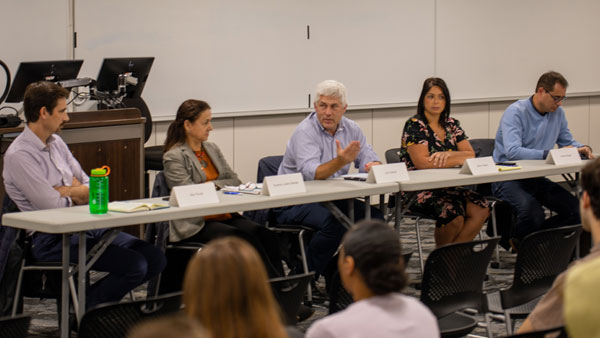The biggest problems require innovative, complex solutions. A recent Bryant University panel offered "A Multidisciplinary Look at Responses to Past, Present, and Future Pandemics" by bringing together a diverse and distinguished group of leaders from a variety of fields to share their perspectives on one of the key issues facing the world today.
Sponsored by Bryant’s School of Health and Behavioral Sciences and Department of Politics, Law, and Society, the panel’s participants included Suzanne Leclerc-Madlala, Ph.D., Senior Anthropologist at the US Agency for International Development (USAID), and several members of the University’s expert faculty including Alex Perullo, Ph.D., Professor of Anthropology; John Dietrich, Ph.D., Professor of Political Science and Chair of the Department of Politics, Law and Society; Professor of Anthropology; Andrea Boggio, J.S.D., Professor of Legal Studies; and Ashley Hughes, MSPAS, PA-C, Program Director for the University’s Master of Science in Physician Assistant Studies. Together, they looked at the many important pieces that go into combatting a global pandemic, from understanding the problem to organization to direct response, and the myriad professions that make a difference in confronting international health crises.
That collection of expertise is crucial when addressing complex, multifaceted issues like public health, noted Dietrich. “Health isn't just about people in science labs or even people in white coats giving out vaccines,” Dietrich said. “It's a much more complicated thing. People who know economics, people who know anthropology, people who know political science, people who focus on legal studies and other issues will all be very crucial in the coming years.”

Leclerc-Madlala, Ph.D., Senior Anthropologist at the US Agency for International Development
(USAID); John Dietrich, Ph.D., Professor of Political Science and Chair of the Department of
Politics, Law and Society; Andrea Boggio, J.S.D., Professor of Legal Studies; and Ashley Hughes,
MSPAS, PA-C, Program Director for the University’s Master of Science in Physician Assistant
Studies program.
Many perspectives, one goal
The panelists all drew from the lessons learned from past global health issues and their own experience to demonstrate the importance of an interdisciplinary approach and the impact that multiple disciplines, including law, anthropology, political secience, and the health professions, can have in concert with one another.
“There are big problems out there and they are complex problems, to be sure. But we can't lose hope in that complexity."
Leclerc-Madlala took the audience behind the scenes of her work at USAID, an independent agency of the U.S. federal government that is primarily responsible for administering civilian foreign aid and development assistance, to help them better understand the factors involved in preparing and implementing a global health response. She also talked about her work in South Africa during that country’s AIDS crisis, where she helped promote public health by examining the social determinants that affect illness.
Our future response to global pandemics, Leclerc-Madlala said, depends on our ability to work together and our will to address world-wide issues and aid others equitably. “There are big problems out there and they are complex problems, to be sure. But we can't lose hope in that complexity,” she said. She also noted that the next generation of professionals facing global crises, some of whom might have been sitting in the panel’s audience, represented a bright future for the field.
“I think being a young person at this time is very exciting because we have the hindsight of some past major pandemics and how we've responded and that informs how we're going to respond going forward,” said Leclerc-Madlala. “So hopefully we've inspired some of the students to think about these big issues."